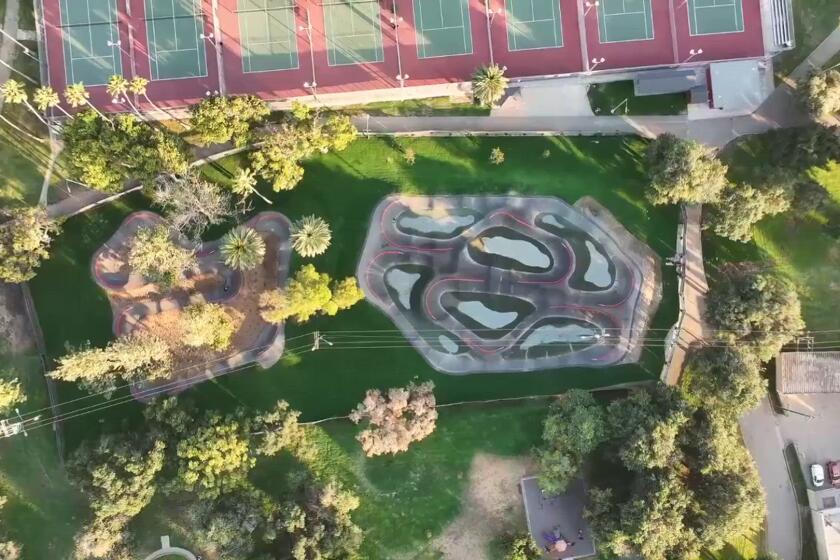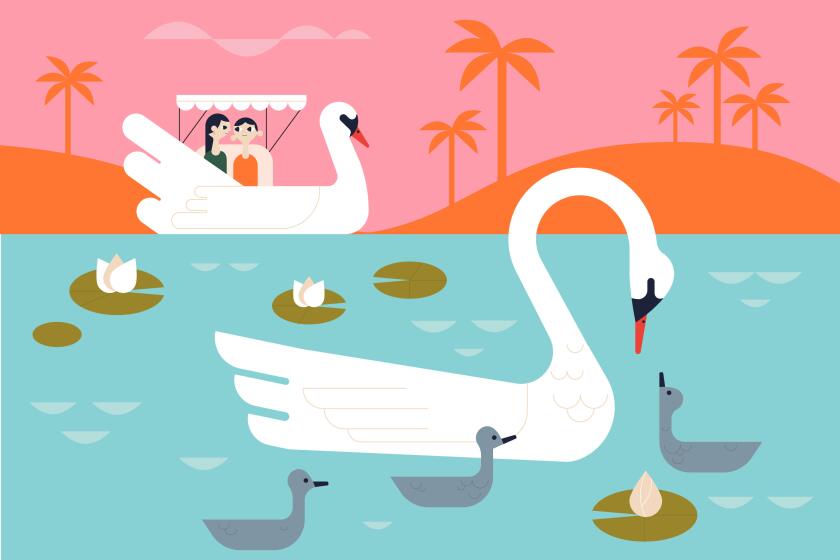Thai Weaver Wakes Before Dawn to Make Nantucket a Basket Case
In the wee hours of the morning, when most of the world is throwing shoes at the rooster, Chin Manasmontri is suiting up for work. He describes the ritual.
“I put on my silk pajamas. Bright red. And baggy,” he says with a broad grin, “with beautiful Chinese embroidery. Very ‘cool.’ ”
He then makes himself a cup of tea and plugs in his tapes of Thai music--”for inspiration and to keep me in touch with my country”--and starts his day.
In a room off his bedroom, perched on a high stool surrounded by tufts of imported rattan from Indonesia, teak from Thailand, ivory from Africa, and local scrimshaw, Mr. Chin begins weaving.
Not the Best
He is one of the new generation of Nantucket’s famous lightship basket weavers. “But not the best,” he insists modestly and vehemently. “There are basket weavers better than I.”
For generations, these unique, much-coveted, sturdy woven rattan baskets with their wooden bottoms have been a badge of the island.
The early ones--woven, signed, and dated by whalers and sea captains--are museum pieces and of enormous value today. These old baskets, large and without lids, were strictly utilitarian, used for storing everything from winter blankets to fresh-dug potatoes. Women also carried them as simple shopping baskets.
Smaller ones made as purses are most in demand today. Swinging on the arms of the well-heeled, they are testimony that, yes, you’ve been to Nantucket, and yes, you’ve arrived at a certain socioeconomic level as well.
Started Working at 7
Chin’s career as a basket maker has had a rather circuitous route.
Born in Thailand, he started at the age of 7 working the streets of Bangkok as a food vendor alongside his mother.
“Like a lot of people in Thailand, my father was addicted to opium. He left us and went to Laos after Thailand made the drug illegal,” Chin says. And as the oldest son of his father’s three wives and 11 children, the weight of responsibility fell on him.
College brought him to the United States, and in 1972 he was hired during the summers that followed as a gardener and houseboy for one of Nantucket’s prominent hostesses.
The demanding job meant working 8 to 12 hours a day. “She had a party every day. Sometime’s I’d have to get out of bed at 12 midnight just to wash four cocktail glasses,” he groans.
In 1974, his employer signed up for a course in lightship basket weaving given by a local master weaver. Illness prevented her from taking the course, so Chin took her seat in class.
“But I had to pay my employer $200,” he explains. At the time that was $50 more than he was making a week.
Encouragement came quickly.
“I fell in love with the baskets,” he says, adding with some pride, “I sold that first basket before I had even finished it in the course.”
On his next trip home to visit the family in Thailand, Chin took the measurements of five of what he considered the most beautiful baskets. From these he had five teak molds made. The molds are another unique feature of Nantucket basket making. They bring an exactness to the shape and size of each piece, and an individuality to each weaver’s work.
Perhaps Chin may not make the best baskets in town, but one rich Texan thinks they’re good enough to have collected 36 of them.
“Oh, that reminds me. I have two more ready to send him,” he says, tapping his forehead.
Cost Up to $1,600
Chin’s handmade purses start at $440 and can soar to $1,600. Simple 10-inch open baskets sell for $140. Some of the handful of top weavers on Nantucket charge much more.
“The actual weaving is a breeze,” he says. “It’s the finishing that’s difficult, and the ivory and scrimshaw that make them expensive.”
All Chin’s ivory comes via Hong Kong, where it has been checked over by officials to ensure it’s been obtained legally, he says. He has to have such certification before the ivory is allowed into the United States. Then it’s designed and roughly carved in Thailand, then back to Hong Kong for the intricate finishing work and polishing.
His designs are characteristically high in relief, sometimes up to an inch. Much of this decoration is commissioned.
“I had a man who wanted an exact replica of his sailboat on his wife’s purse. So I went out on a boat and took pictures of it. I took the pictures to Hong Kong without going to Bangkok to have the design done. What I got back looked just like a sampan, a Chinese junk! I couldn’t believe it! It cost me $250. So I said to the man, ‘You take and pick out something else.’ Ohhh!”
The trading in any whale product is strictly controlled. Each piece is weighed, numbered, and registered. Sperm whale teeth can not be traded out of Massachusetts. “In 1974 when I started making baskets, sperm whale teeth were $45 a pound. Now they are between $250 and $400,” says Chin. Most baskets today are decorated with African elephant ivory.
Family Not Impressed
Not everyone appreciates these exquisite baskets. Chin gave three of them to members of his family as Christmas gifts.
“Did they like them? No! They want to put them in the shop and sell them. They say they want something modern. Something Italian leather,” he says, shaking his head.
“Weaving makes me slow down,” Chin says. “Everyone says I work too much.
“I also do catering here in the summer. I did a wedding party for 75 people last night. And then I opened up a restaurant on July 3.
“But I think I’m gifted in the sense I have so much drive. So when I want peace and quiet, I work on the baskets, usually between 5:30 and 8:30 in the morning.”
Chin manages to spend about two hours a day in his shop on Centre Street. “I know what it’s like to be poor and have nothing to eat,” he says, cupping his hands around a simple, open oval basket--his favorite design.
“And I know you have to work for what you get. Someone talked me into playing Mega-bucks (lottery) for five months. Ten dollars a week it cost me,” he shouts with a guffaw.
“Then I gave it up. I know you have to work for what you want.”
Sign up for The Wild
We’ll help you find the best places to hike, bike and run, as well as the perfect silent spots for meditation and yoga.
You may occasionally receive promotional content from the Los Angeles Times.



